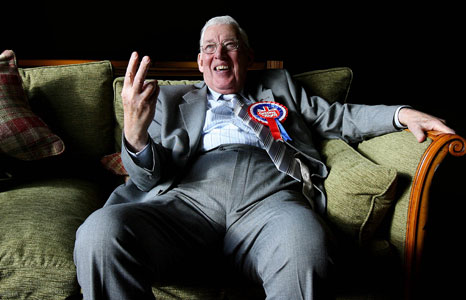I had the misfortune to hear Ian Paisley deliver a sermon once. Rounding the corner of a busy Belfast street I came across a street preacher – a common sight to this day – holding forth on the eternal reality of Sin and Hell. Amidst the pointed gestures and weary familiarity of the message, I recognised the man. Dressed in black, straight backed, he was taller than I expected – but his stature made sense.
Having been born in Northern Ireland, Paisley and others of his ilk filled the newspapers and television screens of my childhood, spewing forth their nationalist cant and infectious bigotry. At the time the divisive rhetoric and identity politics meant little to me, but I was intimately familiar with the concept of the God whose name they invoked in vain. And although my parents strove at all times to stand apart from that too-common Northern Irish identifier – “Are you Catholic or Protestant?” – that this was a God at once loving and standing in unbending condemnation was clear, so his choice of men like Paisley as his messengers made some kind of instinctive sense.
The landscape of my childhood is littered with the inevitable outcomes of these men and their unyielding extremism. Northern Ireland in the early ’90s was a place distinguished by armed police, bomb scares, and the ever-present crackle of hatred. Small towns marked their allegiance with coloured curb stones and crudely painted murals glorifying ‘martyrs’ and murderers as the lampposts held aloft their signifier of choice – Irish tricolour or Union Jack, take your pick. I lived in a relatively peaceful town by the sea, within walking distance of the forest from which C. S. Lewis took the inspiration for his Narnia books, but it seeped in nevertheless.
In South Sudan my experience of violence was much more direct. Conflict zones became part of my daily reality as I became fluent in radio speak, dug foxholes to while away the evenings, negotiated with military commanders, and became intimately acquainted with the sound of bullets passing overhead. It was easy – too easy – to become hopeless in such a place, and many of us did, wearing our hard-won cynicism as a badge of honour.
After two years the low level background hum of danger was abruptly punctuated and I left South Sudan with the taste of fear still fresh in my mouth, retreating to an Ireland I barely recognised. I left hurriedly and in a daze, ostensibly to catch my breath before the next return, the next go around, but soon realised that I was locked headlong into a spin from which there was no quick recovery.
And so I sat for months, picking out new bearings before losing my way all over again, marking out a new topography of home and self that hasn’t yet coalesced, and likely never will. Like most aid workers I have come to the realisation that I live with feet in two worlds, places defined by competing and often mutually exclusive demands. I am no longer sure about my place in this life, but after a year at home I step more lightly between the two, and I have come to value the movement.
But in the midst of it all, there were moments when I was confronted with the fact that my two worlds are perhaps not so dissimilar, at root. When people in South Sudan found out that I was Irish a common reaction was to ask about our own war of liberation and our fight against the British. They could relate to this, and it created a momentary, if uncomfortable, bond. When I asked them why they continued to fight, they pointed me to my country’s recent bloody and internecine past. I had no easy reply.
And so Paisley’s death gave me occasion for reflection, and also reason to hope. For regardless of purity of motive, that this most devoted of sectarians and his Republican counter-parts – cheap preachers of hate, the lot of them – could sit around a negotiating table and learn to govern together, to steer a country from violent conflict to halting peace, attests to the human capacity for healing and forgiveness.
For if there is one thing I have taken away from my time in South Sudan it is that there is no dark continent, no intransigent and uniquely ‘African’ propensity towards violence. We all share the same dark heart.
……………………

Great writing James – keep on rockin’.